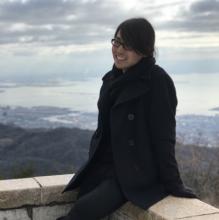Fumiya Nagai
Why did you decide to pursue a graduate degree?
When I was an undergraduate student studying abroad in the US, I had a chance to learn about social issues and the colonial history that Indigenous peoples have faced through my interactions with Indigenous students and instructors from reservations near the campus. This encounter was eye-opening, and after I came back to my home country, Japan, I started to work for international human rights NGOs supporting Indigenous peoples’ rights. All these experiences have made me realise that so much more work needs to be done to achieve decolonisation, inspiring me to further pursue more substantial research and practices.
Why did you decide to study at UBC?
One of the reasons I chose to study at UBC was the research environment and the people I can work with. Notably, not only at the Department of Anthropology which I belong to, but also across the campus, there are many inspiring, leading, and distinguished faculty and graduate students studying various topics related to my research and engaging in community-based and practice-oriented projects. This includes my supervisor, Dr. Carole Blackburn, as well as my supervisory committee members, Dr. Sheryl Lightfoot and Dr. Bruce Granville Miller. My desire to be working with these prominent people pushed me to pursue my degree at UBC. It is also important that UBC has acknowledged the Vancouver campus is located on the traditional, ancestral, and unceded territory of the Musqueam people, and I thank them for their hospitality as well.
What is it specifically, that your program offers, that attracted you?
Through my programme at the Department of Anthropology, I receive robust training in anthropological studies and methodologies, as well as Indigenous studies, and many other topics related to my research project. Before I started my programme at UBC, I had always felt the necessity of further developing my knowledge and deepening my thought, and the training during my programme has been quite helpful. I have also found it attractive that the people I engage with through the programme, including not only my supervisors but also cohorts and staff members, are all very encouraging, supportive, and inspiring.
What was the best surprise about UBC or life in Vancouver?
Before I started the programme at UBC, I did not know who would be part of my cohorts, and I was a little worried about whether I could make good friends. But it has turned out that all my cohorts are my wonderful friends now, and this was the best surprise for me. Also, there are good Japanese restaurants and grocery stores - more than I expected in Vancouver - making my life easier!
What aspects of your life or career before now have best prepared you for your UBC graduate program?
The combination of multiple research and work experiences has prepared me for my graduate programme at UBC. For example, as my research involves interdisciplinary approaches, it has been quite helpful that I completed two masters degrees in different disciplines, anthropology and human rights before I started my PhD at UBC. Additionally, my engagement in Indigenous peoples’ rights movements as an NGO staff member helps me deepen my understanding of the research topics from practical perspectives, further shaping my research design. My lived experiences in Japan have also broadened my comparative view on the topics I study. With additional supports from the people I work with, the trajectory of my life has prepared me for my studies at UBC.
What advice do you have for new graduate students?
I think that many graduate students, particularly those engaging in their projects individually, easily get isolated because we spend many hours reading and writing by ourselves. I find it really important to stay connected with your friends and families, particularly under today’s situation of the global pandemic.
